
Barrington is a village in Cook County and Lake County, Illinois, United States. The population was 10,722 at the 2020 census. A northwest suburb of Chicago, the area features wetlands, forest preserves, parks, and horse trails in a country-suburban setting.

The Alabama Theatre is a movie palace in Birmingham, Alabama. It was built in 1927 by Paramount's Publix Theatres chain as its flagship theater for the southeastern region of the United States. Seating 2,500 people at the time, it was the largest in the Birmingham theater district. The district was once home to many large theaters and movie palaces that featured vaudeville, performing arts, nickelodeons and Hollywood films. Built to show silent films, the Alabama still features its original Wurlitzer theater organ. The Alabama Theatre and Lyric Theatre are the district's only remaining theaters, and as of 2024, both are in operation.
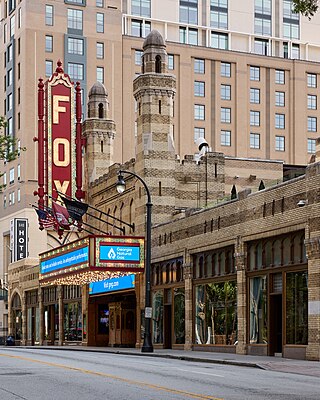
The Fox Theatre, a former movie palace, is a performing arts venue located at 660 Peachtree Street NE in Midtown Atlanta, Georgia, and is the centerpiece of the Fox Theatre Historic District.

The Fox Theatre is a performing arts center located at 2211 Woodward Avenue in Downtown Detroit, Michigan, near the Grand Circus Park Historic District. Opened in 1928 as a flagship movie palace in the Fox Theatres chain, it was at over 5,000 seats the largest theater in the city. Designed by theater architect C. Howard Crane, it was listed on the National Register of Historic Places in 1985.
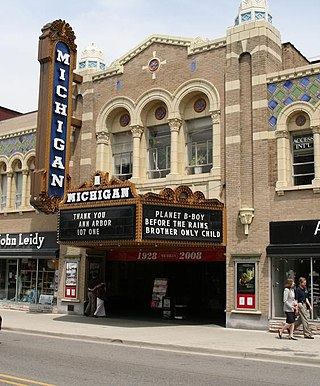
The Michigan Theater is a movie palace in Ann Arbor, Michigan, United States, near the Central Campus of the University of Michigan. It shows independent films and stage productions, and hosts musical concerts.
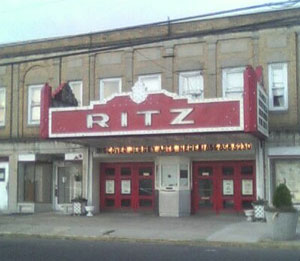
The Ritz Theatre is a theater located in Haddon Township, New Jersey. The venue is owned and operated by The Ritz Theatre Company, a nonprofit organization. The theater was added to the New Jersey and National Register of Historic Places in 2002.

The Jefferson Theatre is a historic performing arts theatre located on Fannin Street in downtown Beaumont, Texas. Designed by Emile Weil and built in 1927, it is an example of Old Spanish architecture and seats over 1400. The theatre was built by Jefferson Amusement Company, which was owned by Saenger Amusements. The theatre is featured on the National Register of Historic Places and recognized as a Recorded Texas Historic Landmark. The theatre recently underwent a comprehensive multimillion-dollar renovation. It is also one of the few theatres in the country containing its original Morton organ, produced by the Robert Morton Organ Company.

The Coronado Performing Arts Center, in Rockford, Illinois, is a 2,400-seat theatre, designed by architect Frederic J. Klein. The theatre cost $1.5 million to build, and opened on October 9, 1927.

Peery's Egyptian Theater is a movie palace located in Ogden, Utah, United States. It was added to the National Register of Historic Places in 1978.

The Chateau Theatre originally opened as a vaudeville house in Rochester, Minnesota, in 1927 with an interior decorated as a medieval village. The theater was converted to a movie house eventually remodeled and reopened as a Barnes & Noble bookstore.

Saenger Theatre is an atmospheric theatre in downtown New Orleans, Louisiana, which is on the National Register of Historic Places. Once the flagship of Julian and Abe Saenger's theatre empire, today it is one of only a handful of Saenger movie palaces that remain.
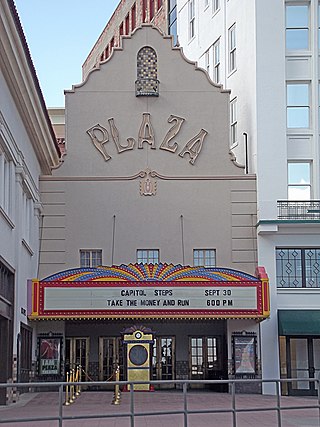
The Plaza Theatre is a historic building in El Paso, Texas, United States, built in 1930. The theater stands as one of the city's most well-known landmarks, and remains operational today. The theatre is a National Historic Building of Significance featuring the 2,050-seat Kendall Kidd Performance Hall, and the smaller 200-seat Philanthropy Theatre. It hosts Broadway productions, musical concerts, individual performers and the annual Plaza Classic Film Festival.

The Redford Theatre is an atmospheric theatre in the Old Redford neighborhood of Detroit. The theatre opened in January 1928, advertised as "Detroit's most unique suburban theatre," due to its grand design, featuring Japanese and Chinese motifs.

The Madam C. J. Walker Building, which houses the Madam Walker Legacy Center, was built in 1927 in the city of Indianapolis, in the U.S. state of Indiana, and as Madam C. J. Walker Manufacturing Company, it was designated a National Historic Landmark in 1991. The four-story, multi-purpose Walker Building was named in honor of Madam C. J. Walker, the African American hair care and beauty products entrepreneur who founded the Madam C. J. Walker Manufacturing Company, and designed by the Indianapolis architectural firm of Rubush & Hunter. The building served as the world headquarters for Walker's company, as well as entertainment, business, and commercial hub along Indiana Avenue for the city's African American community from the 1920s to the 1950s. The historic gathering place and venue for community events and arts and cultural programs were saved from demolition in the 1970s. The restored building, which includes African, Egyptian, and Moorish designs, is one of the few remaining African-Art Deco buildings in the United States. The Walker Building was added to the National Register of Historic Places in 1980.

An atmospheric theatre is a type of movie palace design which was popular in the late 1920s. Atmospheric theatres were designed and decorated to evoke the feeling of a particular time and place for patrons, through the use of projectors, architectural elements and ornamentation that evoked a sense of being outdoors. This was intended to make the patron a more active participant in the setting.

The Pickwick Theatre is an art deco movie palace located in Park Ridge, Illinois, a suburb of Chicago.
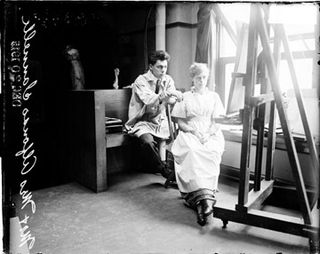
Alfonso Iannelli was an Italian-American sculptor, artist, and industrial designer.

The Virginia Theatre is a live performance and movie theatre in downtown Champaign, Illinois. It has been providing theatrical and cinematic entertainment to the Champaign-Urbana community since its doors opened in 1921. Each year, the Virginia Theatre is host to movies from film reels, plays from various acting troupes, concerts, and Ebertfest, presented by the UIUC College of Media. It is currently owned by the Champaign Park District.

The Riverside Studio in Tulsa, Oklahoma, United States, also known as Tulsa Spotlight Theater, was built in 1928. It was designed by architect Bruce Goff in International Style. It was built as a house with a studio wing for a music teacher named Patti Adams Shriner. The Riverside Studio was listed on the U.S. National Register of Historic Places in 2001 under Criterion C.

The State Theatre is a Spanish-styled atmospheric theatre in Kalamazoo, Michigan, designed by renowned architect John Eberson. The State was built for W.S. Butterfield Theatres in 1927, and remains in operation today, presenting live shows. The theatre was listed on the National Register of Historic Places in 2021.




















